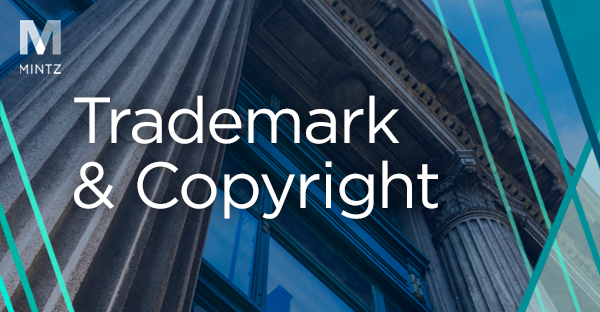
Trademark & Copyright
Viewpoints
Filter by:
U.S. Trademark Office Issues Guide on How It Will Apply the Supreme Court’s Booking.com Decision to Examination of Relevant Applications
October 29, 2020 | Blog | By Susan Neuberger Weller
As we reported in our July 7, 2020 blog post on the USPTO v. Booking.com B.V decision, the U.S. Supreme Court ruled that a proposed mark consisting of the combination of a generic term and a generic top-level domain, like “.com,” is not automatically generic and can be protected as a trademark under certain circumstances.
Read more
SCOTUS Rules “Generic.com” Marks Are Eligible For Federal Trademark Protection
July 7, 2020 | Blog | By Susan Neuberger Weller
In a landmark decision, United States Patent and Trademark Office v. Booking.com B.V., the Supreme Court of the United States, by an 8-1 vote, affirmed the lower court’s determination that Booking.com could register BOOKING.COM as a trademark.
Read more
Second Circuit Declines to Decide if Human Skin Can Be a Tangible Medium of Expression under Copyright Law and Affirms Dismissal of Makeup Artist’s Lawsuit
June 22, 2020 | Blog | By Susan Neuberger Weller
In a recent decision from the Second Circuit, Judges Parker, Chin, and Carney side-stepped a novel question: whether human skin can be the kind of "tangible medium of expression" required for copyright protection. Instead, the court held that a photograph of a makeup artist’s application of a makeup design to a human “fixed” the design for purposes of copyright law and affirmed the district court’s dismissal of the appellant Mourabit’s unjust enrichment and unfair competition/misappropriation claims as preempted by the Copyright Act.
Read more
First Amendment May Protect Use of Trademarks As Artistic Expression
May 27, 2020 | Blog | By Susan Neuberger Weller
In a recent decision from the Southern District of New York, Judge George B. Daniels held that the strong First Amendment interests in protecting free artistic expression warranted summary judgment that Activision Blizzard’s use of Humvee vehicle models in the blockbuster Call of Duty videogames was not a violation of the Lanham Act.
Read more
Supreme Court Holds that States Cannot Copyright Annotated Versions of Their Statutes
April 29, 2020 | Blog | By Michael Graif , Meena Seralathan
On April 27, 2020, the Supreme Court held that annotations to legislative text, even if created by a private contracted party, are not copyrightable materials under 17 U.S.C. §101. Invoking the government edicts doctrine, the Court made explicit the notion that all members of government involved in lawmaking, including state legislators, are barred from being “authors” for purposes of copyright protection.
Read more
US Supreme Court Holds That Trademark Owners Need Not Prove Willful Infringement To Seek An Infringer’s Profits
April 23, 2020 | Blog | By Susan Neuberger Weller, Michael Graif
In a unanimous decision, the US Supreme Court held that a trademark owner need not prove willful infringement in order to seek lost profits from a trademark infringer. The case, Romag Fasteners Inc. v. Fossil Inc. et al., case number 18-1233, involved a long running trademark infringement dispute between the parties.
Read more
It’s Time to Get Colorful: Federal Circuit Holds That Some Color Marks Can Be Inherently Distinctive
April 15, 2020 | Blog | By Susan Neuberger Weller
The Federal Circuit recently held in a precedential ruling that a “color mark” comprising a multiple-color pattern is capable of being inherently distinctive and of registration on the Principal Register, so long as it appears on product packaging rather than on a product itself.
Read more
Considering a Purchase, Sale, or Financing? Make Sure Your Trademark Due Diligence is Thorough
April 9, 2020 | Blog | By Susan Neuberger Weller
Trademark due diligence is the process of analyzing information concerning a company's trademark portfolio and assessing the risks, exposures, and benefits associated with a proposed transaction. In an acquisition, both the buyer and the seller need to ensure that they each are fully informed as to the status of the trademarks at issue.
Read more
How to Maintain Your Trademark Rights When Your Business is Closed
April 8, 2020 | Blog | By Susan Neuberger Weller
Trademark rights in the US are based on use of a mark not on registration. Failure to use your mark on a product or to offer a service to the public can result in an abandonment of your trademark rights and an inability to maintain an existing registration.
Read more
Adding Initials to a Surname Does Not Necessarily Create a Protected Trademark
March 26, 2020 | Blog | By Susan Neuberger Weller
In a recent precedential decision, the TTAB held that the addition of one initial —or possibly even more than one initial—in front of a surname does not necessarily create the impression of a personal name. Rather, the Board held that a surname plus one or more initials may remain “primarily a surname” and, as such, cannot be registered on the Principal Register without proof of acquired distinctiveness.
Read more
YouTube Enables Ads on Coronavirus Content; Brands Should Evaluate Strategies to Mitigate Inadvertent Backlash
March 26, 2020 | Blog | By Karen K. Won
Adding another layer of complexity to sensitively marketing in the COVID-19 environment, YouTube announced on March 11 that it will permit certain creators to monetize (i.e., enable ads on) content relating to coronavirus. Companies and brands should review their approach in this pandemic, including refining YouTube content exclusion parameters and policing their ad environments, if they do not wish to risk association with potentially undesirable videos.
Read more
2nd Circuit Affirms 5Pointz Whitewashing Violated Visual Artists Rights Act
March 25, 2020 | Blog | By Susan Neuberger Weller
The Second Circuit recently affirmed that a developer’s whitewashing of street art painted at the “5Pointz” warehouse complex in Long Island City was a violation of the Visual Artists Rights Act (“VARA,” codified at 17 U.S.C. § 106A).
Read more
The Masters’ Green Jacket is Now a Registered Trademark
March 10, 2020 | Blog | By Susan Neuberger Weller
Since 1949, a green jacket has been awarded to the winner of the Masters Tournament, one of golf’s four major championships.
Read more
Congress Considers Creation of a “Copyright Claims Board” as an Alternative to Handle Small Copyright Claims
January 8, 2020 | Blog | By Susan Neuberger Weller, Lei Xu, PhD
On Tuesday, October 22, 2019, the US House of Representative approved, by 410-to-6, the Copyright Alternative in Small-Claims Enforcement (CASE) Act of 2019, introduced under H.R.2426 by Representative Hakeem Jeffries (D-NY). This bill aims to “establish an alternative dispute resolution program for copyright small claims,” and creates the Copyright Claims Board, a body within the U.S. Copyright Office, to decide copyright disputes.
Read more
Whose Game is On? Carrie Underwood and NBC Sued Over SNF Song
July 9, 2019 | Blog | By Susan Neuberger Weller
As any football fan knows, Carrie Underwood has performed the introductory song for Sunday Night Football since 2013. “Waitin’ All Day For Sunday Night” was the introductory song for the 2013 and 2014 seasons, and “Oh Sunday Night” was the song performed in 2015, 2016, and 2017. On September 6, 2018, Sunday Night Football opened with Ms. Underwood singing a new introductory song entitled “Game On." Well, this “Game” is now the subject of a copyright infringement suit in Federal District Court in New York.
Read more
U.S. Supreme Court Adopts Rule Protecting a Trademark Licensee’s Ability to Use a Trademark after a Bankrupt Licensor’s Rejection of the License
July 8, 2019 | Blog | By Susan Neuberger Weller, Alexander Roan, Tim McKeon
This past May, in a highly-anticipated decision, the Supreme Court held in Mission Product Holdings, Inc. v. Tempnology, LLC that a debtor’s rejection of an executory contract under Section 365 of the Bankruptcy Code has the same effect as a breach of contract outside of bankruptcy. The decision resolves an inter-circuit split on the effect of a bankrupt trademark licensor’s rejection of a trademark license, a question regarded by legal experts in the trademark community as the most significant unresolved legal issue in trademark licensing.
Read more
U.S. Supreme Court to Review Copyrightability of Privately-Produced Annotated State Statutory Compilations
June 28, 2019 | Blog | By Susan Neuberger Weller
Earlier this week, the Supreme Court granted the State of Georgia’s petition to review the Eleventh Circuit’s decision in Code Revision Comm'n v. Public.Resource.Org, Inc., 906 F.3d 1229 (11th Cir. 2018). In that case, the Eleventh Circuit held that the privately-compiled but officially-sanctioned and adopted Official Code of Georgia Annotated (OCGA) was not protected by copyright under the “government edicts” doctrine.
Read more
FUCT? You Heard That Right: Refusing to Register “Scandalous” and “Immoral” Trademarks is Unconstitutional
June 27, 2019 | Blog | By Susan Neuberger Weller
The U.S. Supreme Court, in a split decision, held that the federal ban on registering “scandalous” and “immoral” trademarks is an unconstitutional violation of free speech under the First Amendment of the US Constitution. The trademark FUCT is what was at issue in Iancu v. Brunetti, case number 18-302 (June 24, 2019). Although the mark had been in use on clothing for many years, it was never accepted for registration by the US Trademark Office on grounds that it violated the ban on registration of “scandalous” and “immoral” marks under Section 1052(a) of the Lanham Act.
Read more
Navigating the Legalization of Hemp under the 2018 Farm Bill Involves Changes to the Issuance of Federal Trademarks in the Cannabis Industry
June 11, 2019 | Blog | By Susan Neuberger Weller
Legalizing “hemp” under the Agricultural Improvement Act of 2018 (2018 Farm Bill) has triggered an important change for the examination of federal trademark applications concerning cannabis and cannabis-derived goods and services. In response to the Bill’s enactment on December 20, 2018, the United States Patent and Trademark Office (USPTO) issued a new examination guide to clarify its examination procedures involving hemp goods and services. For businesses in the cannabis industry, the examination guide (recently issued on May 2, 2019) will impact the viability of federal trademark applications filed on or after December 20, 2018 that were once previously barred.
Read more
The FUCT Mark: Is the Prohibition on Scandalous Marks Unconstitutional?
March 14, 2019 | Blog | By Susan Neuberger Weller, Adam Samansky, Serge Subach
The constitutionality of yet another portion of Section 2(a) of the Lanham Act will soon be determined. Following in the footsteps of the blockbuster decision in Matal v. Tam, 137 S. Ct. 1744 (2017) (“Tam”), the U.S. Supreme Court granted certiorari to Iancu v. Brunetti on January 4, 2019. In Matal v. Tam, the Supreme Court held that the prohibition in Section 2(a) of the Lanham Act against registering disparaging trademarks at the U.S. Trademark Office (“USPTO”) was an unconstitutional restriction on free speech. However, Section 2(a) also prohibits the registration of other categories of marks, including marks that are immoral and scandalous. It is the constitutionality of this prohibition which is at issue in Brunetti.
Read more
Explore Other Viewpoints:
- Data Centers & Digital Infrastructure
- AI: The Washington Report
- Antitrust
- Appellate
- Arbitration, Mediation & Alternate Dispute Resolution
- Artificial Intelligence
- Awards
- Bankruptcy & Restructuring
- California Land Use
- Cannabis
- Class Action
- Complex Commercial Litigation
- Construction
- Consumer Product Safety
- Corporate Governance (ESG)
- Cross-Border Asset Recovery
- DEI Legal Developments
- Debt Financing
- Direct Investing (M&A)
- Diversity
- EB-5 Financing
- Education & Nonprofits
- Employment
- EnforceMintz
- Environmental (ESG)
- Environmental Enforcement Defense
- Environmental Law
- Environmental, Social, and Corporate Governance (ESG)
- FDA Regulatory
- False Claims Act
- Federal Circuit Appeals
- Financial Institution Litigation
- Government Law
- Growth Equity
- Health Care
- Health Care Compliance, Fraud and Abuse, & Regulatory Counseling
- Health Care Enforcement & Investigations
- Health Care Transactions
- Health Information Privacy & Security
- IP Due Diligence
- IPRs & Other Post Grant Proceedings
- Immigration
- Impacts of a New US Administration
- Insolvency & Creditor Rights Litigation
- Institutional Investor Class Action Recovery
- Insurance & Financial Services
- Insurance Consulting & Risk Management
- Insurance and Reinsurance Problem-Solving & Dispute Resolution
- Intellectual Property
- Investment Funds
- Israel
- Licensing & Technology Transactions
- Life Sciences
- Litigation & Investigations
- M&A Litigation
- ML Strategies
- Medicare, Medicaid and Commercial Coverage & Reimbursement
- Mergers & Acquisitions
- Patent Litigation
- Patent Prosecution & Strategic Counseling
- Pharmacy Benefits and PBM Contracting
- Portfolio Companies
- Privacy & Cybersecurity
- Private Client
- Private Equity
- Pro Bono
- Probate & Fiduciary Litigation
- Products Liability & Complex Tort
- Projects & Infrastructure
- Public Finance
- Real Estate Litigation
- Real Estate Transactions
- Real Estate, Construction & Infrastructure
- Retail & Consumer Products
- Securities & Capital Markets
- Securities Litigation
- Social (ESG)
- Special Purpose Acquisition Company (SPACs)
- Sports & Entertainment
- State Attorneys General
- Strategic IP Monetization & Licensing
- Sustainable Energy & Infrastructure
- Tax
- Technology
- Technology, Communications & Media
- Technology, Communications & Media Litigation
- Trade Secrets
- Trademark & Copyright
- Trademark Litigation
- Unified Patent Court (UPC)
- Value-Based Care
- Venture Capital & Emerging Companies
- White Collar Defense & Government Investigations
- Women's Health and Technology





